Decision of the wirking committee meeting
Decision of the Working Committee meeting
Working Committee Meeting on 10th March, 2022
Decision of the working committee meeting
Working Committee meeting at Chennai on 10th & 11th January,2022.
Decision of the Working Committee Meeting on 6th September, 2021.
Notice for Working Committee on 6th September, 2021.
Decision of the Working Committee meeting.
Decision of Working Committee meeting
Decision of the Working committee meeting on 31/01/2021.
Decision of the Working committee meeting on 31st December, 2020.
Circular dated 25th February, 2020
Working committee meeting on 9th & 10th February, 2020 at Faridabad.
Working Committee meeting on 28th November, 2019 at BTR Bhaw.
Decisions of Working Committee Meeting.
Meeting at Visakhapatnam on 20th & 21st July,2019
Notice for Working Committee meeting
Decision of the Working Committee meeting held on 5th October, 2018
Discussion & decision of Working Committee meeting dated 7 th June, 2018
Discussion & Decision of Working committee meeting on 4th April,2018.
Decession of the working committee meetings which is held on 4th April,2018.
Decession of the working committee meeting which is held on 16th December,2017
Decision of Working Committee meetting
Circular Dated 15th June,2022.
Office Bearers Meeting on 27 April 2017 (Notice)
Resolution of Chandigarh Convention
NCCOEEE_CIRCULAR_ 18February_2022
NCCOEEE CIRCULAR 17th January 2022
Circular NCCOEEE 19 December 2021
Submission of Memorandum on Electricity (Amendment) Bill 2021
Press Statement_9thAugust_2021
Memorandum to Ministry of New and Renewable Energy. Govt.of India.
Massive protest of lacs of power employees & Engineers on 18th August,2020
On 15th a meeting of NCCOEEE WB Chapter took place on line through WhatsApp considering countrywide lockdown situation as a cause of Corona virus pandemic. Committee members from EEFI,AIFEE,INEWF,AIPF(AIUTUC), AIFOPDE were present at the meeting. Comred Dipak Roychoudhury presided over the meeting. Comred Kanchan Mukherjee, being convener of NCCOEEE WB Chapter placed his written report on current situation and about the attacks on working class and working people as a whole by BJP led Central government and few State Governments by way of introducing Electricity Act,2003 (Amendment) Bill,2020 for consideration,changes in Labour laws, Increase of working hour 8 to 12 hours etc taking the opportunity of lockdown.
He placed his proposals for movements and struggles in line with the decisions taken by NCCOEEE.
All attending Comreds took part in the discussion and finally following decisions were adopted unanimously.
N:B - 1) It has also been decided among the representatives of the aforesaid organizations over telephone that in case protest programme on 20th May cannot be lodged due to natural calamity, which has every possiblity according to weather forecast protest will be lodged on any day from 21th to 27th instant, excepting on 25th May, being EID Festival.
2. NCCOEEE has preponed the national protest day will be obserbed on 1st June,2020 , accordingly National protest day will be obserbed in West Bengal on 1st June,2020 instead of on 2nd instant.
Workers and Engineers of Electricity industry took part in the strike all over the country in huge number. Workers took part in the strike directly responding to the calls of respective trade unions, while Engineers and Junior Engineers in support of the strike call, boycotted the work at the behest of NCCOEEE, the broad based National platform of Electricity Employees and Engineers.
To what extent the strike was successful or failed cannot be adjudged through statements of the Government or state owned power utilities. Best indicator is power consumption. It has been so far revealed that in last quarter of 2019 power consumption dropped to the extent of 13% in comparison to the similar period of 2018. Modi Charisma did not work in so far power consumption is concerned.
As gathered from different power system load despatch centres all over the country, the mid day system demands in different states on date fell down to the extent of 5 to 20% in comparison to normal January workday.
Northern India states are facing squally weather from winter rain. Thousands of striking workers, Junior Engineers and Engineers have mobilised in front of the state Power utility headquarters and major power installations raising placards and banners of their demands. Magnificent demonstration observed in UP, Punjab, Haryana, Chandigarh and Himachal Pradesh. In Eastern India, Power workers of Odisha and West Bengal took part in the strike including demonstration at different districts. In North east Assam and Tripura had good number participation of Striking Workers, Junior Engineers and Engineers. Strike in Kerala and Tamil Nadu remained massive, while in Karnataka only Contract Workers took part in the Strike. In Western India power workers and Engineers of Maharashtra, Madhya Pradesh and Chhattisgarh took part in the Strike in huge number.
NCCOEEE greets all the members of its constituent organisations for making the Strike a grand success all over the country.
(Prasanta N Chowdhury)
Convener
Cell : 9830264170
Press Release on 8th January Strike in Power sector.
"Decisions of NCCOEEE meeting took place at BTR Bhawan, New Delhi on 31st July, 2019."
NCCOEEE National Forum convey warm greetings to all NCCOEEE constituents along with their members across the country for massive participation in the first day (8th January, 2019) of Two Day Strike / Work Boycott against Government’s game plan to curb the right to electricity for the rural as well poor people of India through enactment of Electricity (Amendment) Bill, 2018 concurrently supporting the call of two days’ General Strike on 8th and 9th January 2019 upon 12 point charter of demand for people of all walks of life, by all central Trade Unions and independent National level Federations of core Industries.
Government’s action towards floating the Draft Electricity (Amendment) Bill, 2018 in the public domain for opinion was reciprocated by NCCOEEE on 3rd October, 2018. Formal Notice of Strike / Work Boycott was sent on 10th December, 2018. Only on 3rd January, 2019, Ministry of Power acknowledged the same indicating the Strike as an immature step. Three million workers, employees and engineers of power sector have replied today in a befitting manner. NCCOEEE leadership expect the struggle will be intensified in the second day on 9th January, 2019 and good sense will prevail upon the Government to concede the demands.
(Prasanta N Chowdhury)
Convener
GREETINGS TO UP STRUGGLE 10.04.18
Rally at Odisha on 14th March,2018 against Electricity (amendment) billl,2014 & exploitation of the Electricity Worker
NORTHERN REGIONAL CONVENTION
NORTHERN REGIONAL CONVENTION
NEW INDIAN EXPRESS
MONEY CONTROL
BUSINESS WORLD
FINANCIAL EXPRESS
TIMES OF INDIA
PUNJAB NEWS EXPRESS
DAINIK BHASKAR
SATYAGRAH
NAV BHARAT TIMES
TAHLKA NEWS
December 28, 2017 // 0 Comments
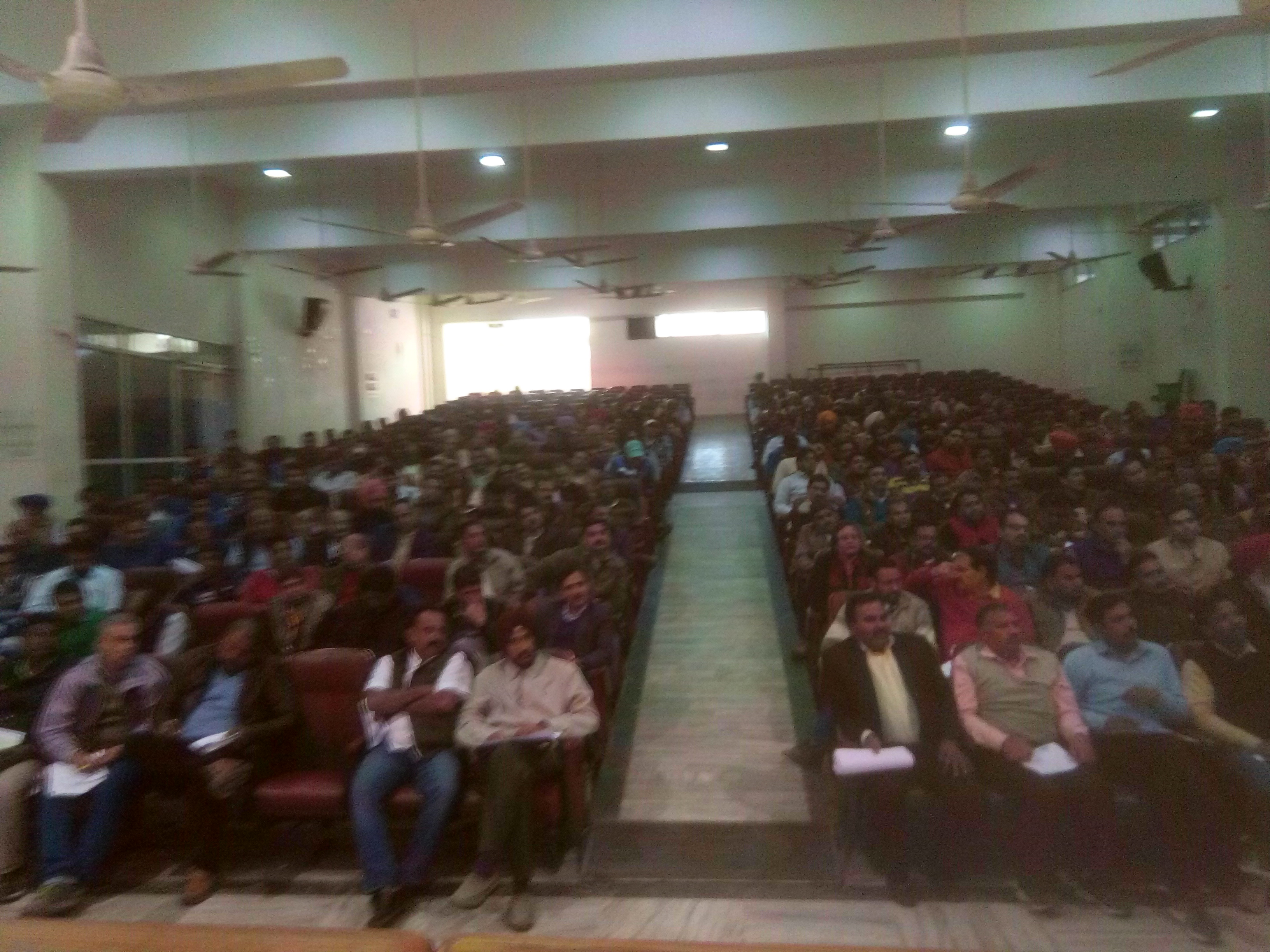
NCCOEEE Northern Regional Convention held at Chandigarh on 28th December. Participated by representative of all NCCOEEE constituents of Haryana, Punjab, J&K, HP, UP, Rajasthan, Delhi, Chandigarh UT. Shailendra Dubey, Prasanta N Chowdhury, Subhas Lamba, Shamitulla, Devinder Singh from AIPEF, EEFI, AIFEE, AIFOPDE resectively took part on behalf of NCCOEEE National chapter [...]
December 5, 2015 // 0 Comments

NATIONAL COORDINATION COMMITTEE OF ELECTRICITY EMPLOYEES & ENGINEERS B.T.RANADIVE BHAWAN, 13-A, ROUSE AVENUE, NEW DELHI -110 002, Tel fax.011- 23219670 [...]
NCCOEEE Protest in front of Power Ministers' conference at Kochi, Kerala
November 10, 2015 // 0 Comments

NATIONAL COORDINATION COMMITTEE OF ELECTRICITY EMPLOYEES & ENGINEERS B.T.RANADIVE BHAWAN, 13-A, ROUSE AVENUE, NEW DELHI -110 002, Tel fax.011- [...]
August 19, 2015 // 0 Comments
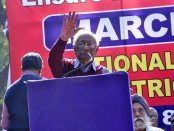
NATIONAL COORDINATION COMMITTEE OF ELECTRICITY EMPLOYEES & ENGINEERS B.T.RANADIVE BHAWAN, 13-A, ROUSE AVENUE, NEW DELHI -110 002, Tel fax.011- 23219670 [...]
NCCOEEE EASTERN & NORTH EASTERN REGIONAL CONVENTION
July 27, 2015 // 0 Comments
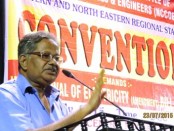
NATIONAL COORDINATION COMMITTEE OF ELECTRICITY EMPLOYEES & ENGINEERS (NCCOEEE) EASTERN & NORTH EASTERN REGIONAL STATES' CONVENTION DEMANDS WITHDRAWAL OF ELECTRICITY [...]
SOUTHERN REGIONAL CONVENTION HELD ON 14TH JULY, 2015
July 24, 2015 // 0 Comments
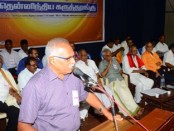
WORK REPORT OF COTEE REGARDING CONVENTION AGAINST ELECTRICITY AMENDMENT BILL 2014 AT CHENNAI ON 14TH OF JULY 2015 As per the decision taken by the NCCOEEE meeting on [...]
NCCOEEE SOUTHERN REGIONAL CONVENTION
July 16, 2015 // 0 Comments
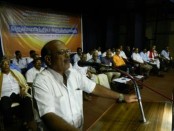
This Southern Regional Public Convention with the initiative of Electricity Emploees and Engineers assembled on 14th July, 2015 at Raja [...]
One Day Token strike during Monsoon session of Parliament
June 28, 2015 // 0 Comments
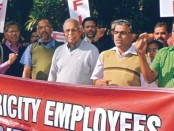
The NCCCOEE meeting held on 25th June 2015 at BTR Bhavan New Delhi decided to conduct a one day token strike/ work boycott by Electricity Employees and Engineers on the day [...]
June 27, 2015 // 0 Comments
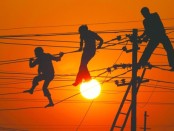
The National Co-ordination Committee of Electricity Employees and Engineers (NCCOEEE) a broad based platform of all major Federations of Power sector employees and engineers [...]
NCCOEEE Northern Regional Convention held on 24th June, 2015
June 25, 2015 // 0 Comments
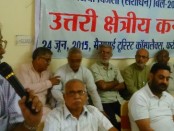
The Northern Regional Convention of NCCOEEE was held on 24th June, 2015 at Mapie Tourist Complex, Faridabad, Haryana. The above Convention inaugurated by Com. K.O. Habeeb [...]
NCCOEEE National Meeting to be held on 25th June 2015
June 25, 2015 // 0 Comments
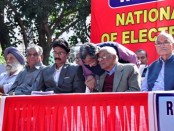
A meeting of National Co-ordination committee of Electricity Employees and Engineers will be held at BTR Bhavan, New Delhi on 25th June 2015 to decide upon various activities [...]
NCCOEEE Letter by Com. AB Bhardan to Power Minister Dated 21-03-2007
April 21, 2007 // 0 Comments
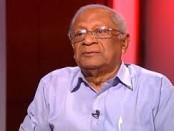
NATIONAL COORDINATION COMMITTEE OF ELECTRICITY EMPLOYEES & ENGINEERS B.T.RANADIVE BHAWAN, 13-A, ROUSE AVENUE, NEW DELHI -110 002, Tel fax.011- 23219670 e-mail: [...]
NCCOEEE Convention at New Delhi
January 21, 2002 // 0 Comments
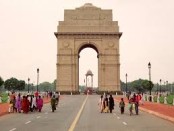
The Electricity Employees and Engineers in Indian Power Sector under the banner of National Coordination Committee of Electricity Employees & Engineeers was held on 7th [...]
Round Table Conference at Vishakhapattanam
8th National conference of EEFI held on 18th to 20th August,2017 at Hydrabad,Telengana
Conclution the 8th National Conference of EEFI with International
Observe Protest Day, 1st June 2020
Working class and the Great October Revolution
K Hemalata
The centenary of the Great October Revolution is being celebrated by the working class all over the world during the last one year. The 15th conference of CITU decided to observe the centenary of the Great October Revolution by focussing on the ideological development of its cadres. Many classes, conventions, meetings, seminars etc have been conducted all over the country by the state committees and affiliated unions of CITU as per this decision. In addition many other organisations of different sectors of the working class – of insurance, bank, telecom, state and central government departments, etc – have organised various programmes to commemorate the occasion. The Left parties too observed the centenary all over the country.
The World Federation of Trade Unions (WFTU) representing 92 million workers in 126 countries in all the continents has observed the centenary through various programmes across the world. The WFTU leadership will be participating in the concluding event being organised by the Communist Party of Russian Federation in Moscow.
The Great October Revolution was an event that took place in Russia a hundred years ago. It led to the establishment of socialism in an industrially backward country like Russia. What is its significance that despite the reverses and setbacks to socialism in Russia as well as in the east European countries, the working class across the world continues to be inspired by it?
The October Revolution was an event that literally ‘shook the world’, as the American socialist and journalist John Reed wrote in his eye witness account, ‘Ten Days that Shook the World’. It sounded the death knell of imperialism. The workers, peasants and other sections of toiling people tore apart the old exploitative structure of capitalism and erected the framework for a new exploitation free society, a socialist society. It showed the future path for the development of humanity. It was a shining example of ‘concrete analysis of concrete conditions’ and masterly application of Marxist principles to change society, by the Bolshevik party, the party of the working class.
What the Revolution has achieved was unprecedented and unimaginable at that time. It was a wonder. Even the so called ‘welfare states’ in Europe after the Second World War could not equal the rights and benefits achieved by the working class – land distribution, workers’ control over factories, the right to recall elected representatives, free education and health for all, free nurseries, communal kitchens and laundries to liberate women from the back breaking domestic work. The comment of the Czech communist Fuchs ‘All our tomorrows had become today’ aptly describes the dramatic changes achieved by the revolutionaries.
The impact of the October Revolution on the national liberation movements across the world, the role of Soviet Union in defeating Nazi Germany in the Second World War, the immense sacrifices made the Soviet people in saving the world from the clutches of Hitler’s fascism are well known. Socialist Russia extended unconditional help and support in developing the technological and industrial base in our country through the establishment of various public sector units, the establishment of premier institutions for engineering education and in the development of a self reliant economy after our independence.
What lessons can the working class of India learn from the experiences of the working class of Russia, which led a successful revolution that changed the world?
The conditions of the working class and their trade unions in Russia before the Revolution were not better than that of the working class in our country today. They were far worse. Though the labour movement in Russia began with the development of capitalism in the country and the first strike was held sometime between 1870 and 1880, it was not until 1905 that unions were organised. Trade unions soon expanded their influence. But repression on the unions and police persecution increased since 1907. The union committee members faced constant threat of arrest by the police. The police confiscated their funds and registers. The leaders including the presidents and secretaries of the unions were deported to Siberia. Czarism made it impossible for the unions to conduct their day to day activities and organise struggles on even the economic demands of the workers. Matters became worse with the declaration of war in 1914. War was used to further suppress the trade unions .The extent of repression can be understood from the fact that while around 200,000 workers were organised in trade unions in 1905, on the eve of the Revolution in 1917 there were only three unions with a total membership of 1500.
But despite this rudimentary state of the trade unions, the working class and other sections of toiling masses carried on their economic struggles with great tenacity. The working class gained its class consciousness through such struggles under conditions of severe czarist repression.
The war devastated the country. Conditions of the workers worsened. Food became scarce. Soldiers were forced to fight in the freezing cold without proper clothes or equipment. Discontent was growing among all these sections.
It was in such conditions that the women workers of Petrograd observed International Women’s Day, for the first time on a working day on 23rd February 1917 (8th March as per the new calendar), by striking work. The women workers of the textile factory came out and marched on the streets calling out the workers of different factories on the way to join them. Hundreds of thousands of workers, men and women, joined the procession demanding bread and end to war. They demanded an end to monarchy. The military arrested hundreds of their leaders. Over hundred people were killed on the day. Unhappy with the terror let loose on the people large section of the army joined the revolutionaries. This February Revolution forced Czar Nicholas II to abdicate.
The overthrow of czarism unleashed the creative and organising initiatives of the working masses. The workers organised into the Soviets of Workers’ Deputies. These were councils of workers. In fact the first Soviet was established in Ivanovna - Voznesensk during a strike of textile workers in 1905, as a strike committee. Later it developed into an elected body of the town’s workers. This was followed by the establishment of Soviets of Workers’ Deputies in around 50 towns but these were crushed soon. The leaders were arrested and imprisoned. Soviets of Workers’ Deputies and Soviets of Soldiers Deputies, who were from the peasant families and represented the peasants were formed and became active after the February Revolution. 1090 delegates representing more than 400 different Soviets participated in the first congress of the Soviets held in June 1917. By the time of the October Revolution there were over 900 Soviets. Majority of these including those in Petrograd and Moscow were controlled by the Bolsheviks. The Soviets of Workers’ Deputies were instruments of political struggle for the working class of Russia.
Lenin emphasised the need to win over majority of the Soviets by clearing the illusions that they had on the provincial government, by exposing the government through patient, systematic and persistent explanation. He stressed on the need to teach them the necessity of transferring the entire state power to the Soviets. This was an important task set before the Bolsheviks. He also laid lot of emphasis on organisation. He said ‘To achieve such a victory (victory over capitalists), to have the workers and poor peasants take power, keep that power and make proper use of it, you will need organisation, organisation and organisation...Don’t put your trust in words. Don’t be misled by promises. Don’t overestimate your strength. Organise at every factory, in every regiment and every company, in every residential block. Work at your organising every day, every hour; do that work yourselves, for this is something you cannot entrust to anybody else. Work to steadily, soundly and indestructibly build up full confidence in the advanced workers, on the part of the masses... Such is the one guarantee of success’.
Lenin taught the working class about the importance of forging unity with the peasantry. Addressing the All Russian Trade Union conference he urged the workers to take the initiative to organise the agricultural workers and win over the majority of people to their side. ‘The first commandment of any trade union movement is not to rely on the State but to rely on the strength of one’s own class. The transfer of power to the revolutionary, oppressed class is the only way out of the present crisis, and the only remedy for economic dislocation and the war’, he said.
These words of Lenin are as relevant now, when the working class is being attacked by the capitalist class trying to protect their profits in the wake of the systemic crisis of capitalism, as they were around a hundred years ago.
Today major sections of the working class in our country are under the influence of the ideology of the ruling classes. The ruling classes are attacking the lives, livelihoods, working conditions and basic rights of all sections of the toiling people – the workers, agricultural workers, peasants, artisans etc – through the neoliberal regime. These policies are meant to transfer public wealth into the hands of a few big private corporations. At the same time they are able to create illusions among the people through their false promises and slogans though people are slowly getting disillusioned. They are trying to weaken and thwart united struggles of the working people by evoking communal passions, caste feelings, and regional sentiments.
Bringing the working class and the toiling people from the influence of the ruling classes requires ‘patient, systematic and persistent explanation and teaching’ as Lenin taught us. Ten Days that Shook the World says that during the Revolution ‘All Russia was learning to read and reading – politics, economics, history – because the people wanted to know... Hundreds of thousands of pamphlets were distributed by thousands of organisations and poured into the armies, the villages, factories, the streets.’ People absorbed them like hot sand drinks water! These ‘were not fables, falsified history, diluted religion, and the cheap fiction that corrupts but social and economic theories, philosophy, the works of Tolstoy, Gogol and Gorky...’
The war devastated the country. Conditions of the workers worsened. Food became scarce. Soldiers were forced to fight in the freezing cold without proper clothes or equipment. Discontent was growing among all these sections.
Today we need to create such urge among the working class and the toiling people to know, to understand the truth about the link between their day to day issues and the policies being pursued by the ruling classes, whatever sweet and attractive slogans they mouth. At the same time we have to make serious efforts to satisfy that urge to know and understand the truth by exposing the politics behind the policies through their own experiences; using the language that they can easily understand. We have to develop the class consciousness of the working class to realise its historic role in ending the inhuman capitalist exploitation and replacing with an exploitation free socialist system. We have to prepare it to discharge this role.
The Great October Revolution teaches us that this is the only way to end the exploitative capitalist system.
![]() EEFI TU School at Pondichery on
22nd & 23rd July & 29th & 30th July at Faridabad
EEFI TU School at Pondichery on
22nd & 23rd July & 29th & 30th July at Faridabad
"NCCEEEO EASTERN REGIONAL CONVENTION ON 30TH JANUARY,2018 AT PATNA"
![]() "Working Committee meeting at 11AM
on 7th June,2018 at BTR Bhawan, New Delhi.
"Working Committee meeting at 11AM
on 7th June,2018 at BTR Bhawan, New Delhi.
" Working committee meeting to be held at Delhi on 4th April,2018"
" Rally On 14th March,2018 will be organised all state capitals by NCCOEEE.."
Notice for Working Committee Meetting
Working Committee Meeting on 28 April 2017 (Notice)
April 15, 2016 in Uncategorized // odisha communiqe
December 5, 2015 in NCCOEEE // NCCOEEE CIRULAR
October 23, 2015 in Uncategorized // EEFI WORKING COMMITTEE MEETING ON 21-22, GUWAHATI, ASSAM